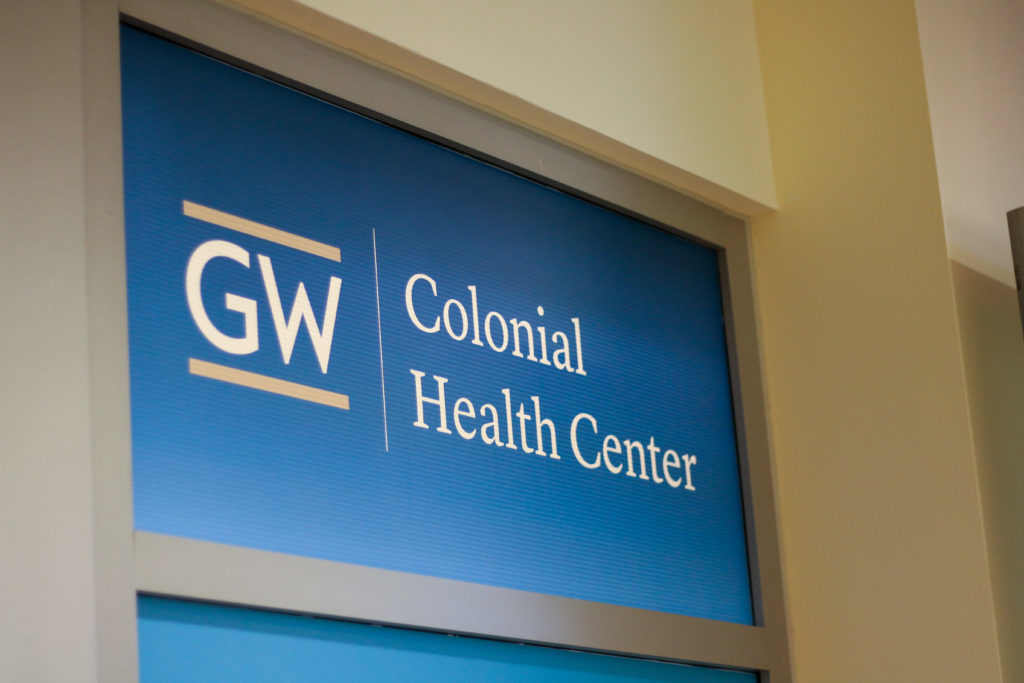About 10 percent fewer students waived a GW-offered student health insurance plan this fall compared to 2018.
Officials said about 8,800 students – roughly 70 percent of undergraduates – waived the Aetna student health insurance compared to about 9,600 students in 2018, the first year GW mandated that all students have health insurance. More than 10 students who are enrolled in the Aetna health insurance plan said obtaining health insurance through GW gave them affordable and accessible health care through the Colonial Health Center.
“Health insurance is not only essential for management of any chronic or long-term care needs, but emergency medical care costs are expensive,” University spokeswoman Crystal Nosal said in an email. “They can lead to insurmountable debt, from which it is difficult to recover. The coverage ensures students can get the care they need for both chronic care and emergency situations.”
All undergraduate, medical, on-campus nursing, on-campus health science and all international students holding a J1 or F1 visa are automatically enrolled in student health insurance, according to the CHC website. Students can waive the insurance if their existing health care coverage meets criteria outlined by the University.
Nosal said officials have conducted open houses around campus to talk to students about the benefits of the Aetna insurance and how to use the policy. The CHC is working to accept more health insurance providers besides Aetna in the future, she said.
She said international students who are less familiar with health insurance options available in the United States have benefited from the health care plan.
“We know this is particularly important to international students that may not be familiar with the US healthcare system,” Nosal said.
Cara Schiavone – a former summer fellow at the GW chapter of the Roosevelt Institute, a student-led group that advocates for progressive legislation – found in 2018 that the cost of the Aetna health insurance program is “exorbitant” compared to the insurance programs of peer schools.
In 2018, the switch to automatically enroll all undergraduate students – except those in the College of Professional Studies – in the program slashed the annual cost of the plan from about $4,100 to about $2,750.
Students enrolled in the Aetna plan said they purchased the insurance plan because it offers free health services like vaccinations, sexually transmitted infection testing and mental health counseling.
Akshara Desai, a freshman and international student who uses Aetna health insurance, said she chose the student health insurance plan because it was more convenient and affordable than other U.S. providers.
Desai said the plan can also ensure that students aren’t discouraged from seeking out emergency health care services, citing the example of her friend who does not have the Aetna insurance whose parents told him not to go to the hospital unless he was “dying” because of high emergency room costs.
The student health insurance program covers 100 percent of the cost of services like medical office visits, “routinely dispensed” prescription medications, annual STD screenings, physical examinations and immunizations that are offered at the center, according to the CHC website. The plan covers 100 percent of the cost of Mental Health Services office visits and group counseling.
Emergency room visits at hospitals that accept the insurance require students to pay a $100 co-payment and the plan covers 80 percent of the balance of the negotiated charge per visit, the CHC website states.
“I did not know that the American health care system cost so much money,” Desai said. “Emergency services are just so damn expensive.”
Sophomore Selena Hernández said she purchased Aetna insurance after her parents divorced because she did not have enough time to sign up with one of her parent’s insurance providers before the semester began. Hernández said she will not purchase the plan again next year because her health care providers at home do not accept the student plan.
Hernández added that the health center should accept other forms of health insurance besides Aetna to ensure that students aren’t discouraged from seeking out health care services because of CHC fees.
Students who use CHC services but are covered under other health insurance providers are required to pay a fee for each visit to the center.
“You shouldn’t have to fear paying money to be treated for anything, and we shouldn’t fear having to pay for a doctor’s note just to be excused from class,” Hernández said.
Freshman Kyaw Htet recently had a blood test at the Colonial Health Center in order to check if he still had immunity to a disease he was vaccinated against as a child. Htet said the entire visit was free of charge and that a physician treated him “efficiently.”
“Right now I am pretty satisfied,” Htet said.
Freshman student Hasna Chowdhury said she was no longer covered under her parents’ insurance and was automatically enrolled in the student health insurance after she turned 18. She said using the University’s plan ensures that she can receive convenient health care services at the CHC.
“There’s no point in education if I’m not mentally or physically healthy,” Chowdhury said.
Shannon Mallard contributed reporting.




